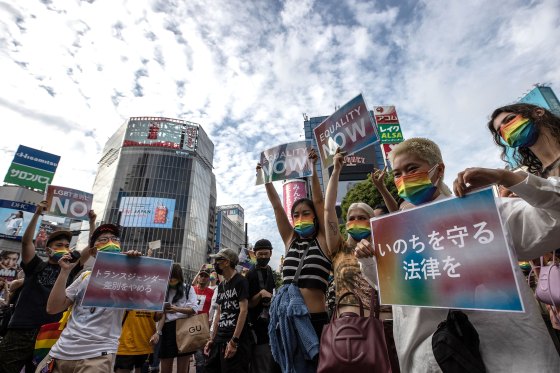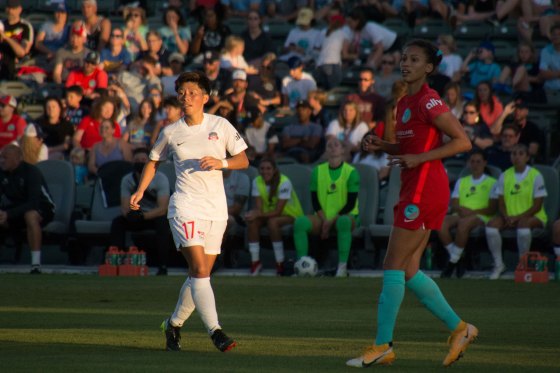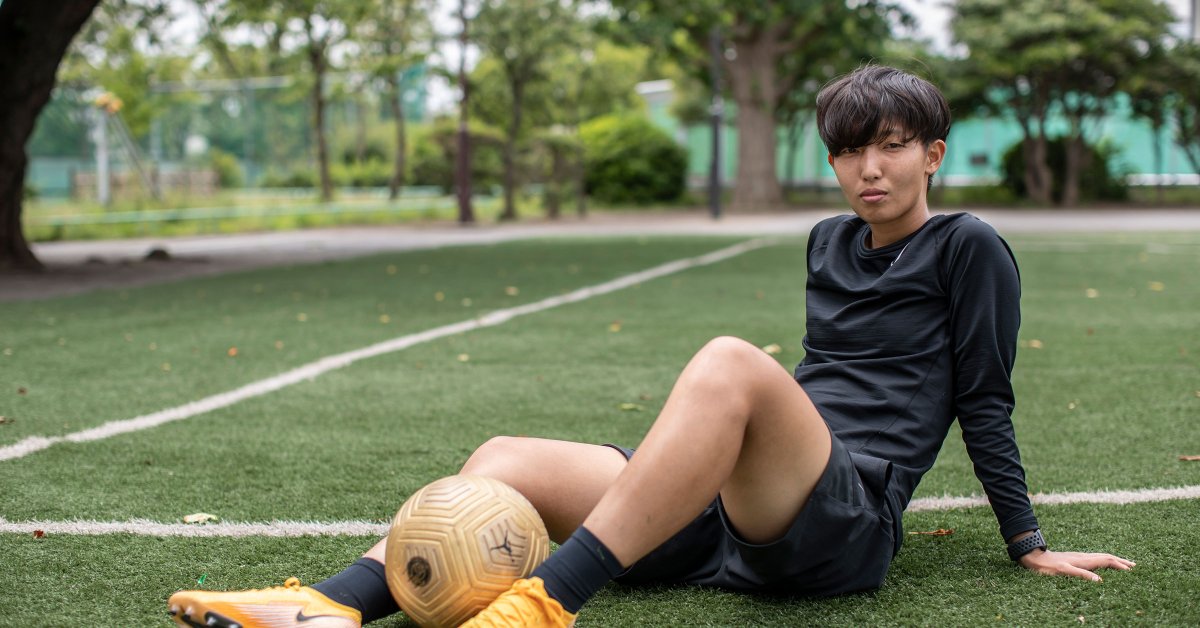[ad_1]
Shiho Shimoyamada had just moved from Japan to Germany to play soccer professionally in 2017 when German lawmakers voted to legalize same-sex marriage. She and her teammates were on the bus home from a match, and the news brought animated conversations from LGBTQ players about how the decision would improve their lives.
One gay teammate started musing aloud about her hope to retire in two years to have children; she looked forward to being able to enjoy a few beers on the weekends, and she hoped that she would bring her kids to watch the team’s matches when they were old enough, Shimoyamada recalls.
[time-brightcove not-tgx=”true”]
Shimoyamada, who is also gay but not out publicly at the time, says she was swept with a feeling of envy. “She was imagining this future for herself, but I had never imagined that I would have such a future,” 26-year-old Shimoyamada tells TIME. “It wasn’t very realistic for me.”
Japan lags far behind its rich-world peers in LGBTQ rights. Same-sex marriage has not been legalized, there is limited legal recognition for same-sex couples and few protections against discrimination in the workplace or in public. Japanese law also requires transgender people to be surgically sterilized if they want legal recognition of their gender identity.
Many LGBTQ people in Japan hoped that the 2020 Olympics would force changes that would allow them to have a better future. Dozens of LGBTQ athletes from around the world will be competing in the Games starting July 23, including New Zealand weightlifter Laurel Hubbard, who will make history as the first openly transgender athlete. However, there are no publicly out LGBTQ Olympic athletes representing Japan.
So with the world’s attention on the nation of 126 million, activists threw their weight behind pushing the government to enact a law banning discrimination against LGBTQ people—and for awhile, it looked like they might have success. But after the bill provoked a backlash from some members of Prime Minister Yoshihide Suga’s conservative Liberal Democratic Party (LDP), the legislature went into recess without passing the measure.
Now LGBTQ athletes and activists are asking whether Japan has missed the best opportunity to push through legislative reform in their generation. “I was hoping the Olympics would push forward LGBTQ issues… that the Olympics would leave a positive legacy,” Fumino Sugiyama, 39, a transgender activist and a former fencer for Japan’s women’s national team, tells TIME. “I really hate to say this, but it has become a lot less hopeful.”
A brave decision to come out
Shimoyamada moved home after two seasons with the German soccer club SV Meppen in part because she hoped she could use the Olympics as a turning point for LGBTQ rights in Japan. Although several retired Japanese athletes had come out, she thought that it was necessary for a current athlete to demonstrate that they could come out and continue to compete on their own terms.
So in February 2019, she posted on Twitter that she had a girlfriend alongside a link to an interview with her alma mater about her sexuality, making her Japan’s first openly gay active professional athlete. Three months later, she returned to Japan and started looking for a Japanese team to join. She spoke about her experience to the media, corporate audiences and through platforms like Pride House Tokyo, a community center that will act as a hub for LGBTQ people during and after the Games. “I wanted to set myself free, and that’s one of the major reasons I decided to come back to Japan and come out,” she says.
Shimoyamada had known that she was a lesbian since high school, but for years, she hid her identity, except from her closest friends. She recalls going out for drinks with teammates and being asked what her “type” was. “I just said, ‘Oh someone who’s a good runner,’ so that I didn’t mention the gender of the person,” she says. “There were so many occasions that I had to lie to people around me and it was very frustrating.”

But she says that living abroad shifted her perspective: “In Germany being LGBTQ is so normal. People treat them as if they are no different from straight people. It was so easy to live there compared to being in Japan, and I realized how difficult it is to live in Japan being a lesbian.”
Shimoyamada, who now plays for Sfida Setagaya FC in Tokyo, has inspired at least a few other athletes to follow in her footsteps. Airi Murakami, a 31-year-old former women’s national rugby player, who came out as gay in October 2020 in an Instagram post, tells TIME that Shimoyamada is a role model for her (as is American soccer star Megan Rapinoe).
Murakami says that she was bullied and treated like an outcast in high school after her basketball teammates found out that she had a girlfriend. She says that she struggled with feelings of shame for most of her life. “People treated us as if it was a crime so I started feeling like I was committing a crime,” she says.
The rugby player says she was terrified when she came out on social media, but she wanted to overcome the negative feelings that had weighed on her. She tried not to look at her phone, but she kept picking it up to check how many likes the post had—and who was commenting. To her relief, most of the feedback was positive. “After I came out, other LGBTQ people who I hadn’t met before started texting me and messaging me saying that I gave them courage,” she says.
She was also contacted by other athletes who told her that they weren’t ready to come out publicly, but that her actions had encouraged them.
No progress toward official acceptance
Years of campaigning by LGBTQ rights activists in Japan has led to increased awareness of LGBTQ issues. Acceptance of homosexuality in Japan rose from 54% in 2002 to 68% in 2019, according to a poll by the U.S.-based Pew Research Center. But Japan ranks second-to-last, only ahead of Turkey, in gay and transgender rights in the Organization for Economic Co-operation and Development (OECD), a group of 38 wealthy and middle-income countries.
It’s the only member of in the Group of Seven (G7) industrialized nations that hasn’t legalized same-sex marriage. Although a handful of cities and wards issue “partnership certificates” that grant some rights to same-sex couples, they are not available across the country and they fall short of full marriage rights. In March, a court in the northern city of Sapporo ruled it “unconstitutional” to ban same-sex couples from marrying, but the case is still working its way through the courts, and there have not yet been concrete changes.
People like Murakami, who says that she would like to marry her girlfriend, are desperate to have the rights that heterosexual people enjoy. “I do love Japan. I hope that the situation will change, so that I won’t have to move away from Japan to get married,” she says. “I’m hopeful that Japan is undergoing changes.”
Japan’s harsh law on gender identity means Sugiyama, the transgender activist, isn’t legally recognized as male. This precludes him from being able to marry his wife, with whom he has lived for more than 10 years and has two small children. “I don’t have any legal foundation to establish a family connection,” he says.
Read More: A Court Ruled Japan’s Same-Sex Marriage Ban ‘Unconstitutional.’ Here’s What’s Next for LGBTQ Rights
Activists have for years called for the Japanese government to introduce laws that would protect LGBTQ people from discrimination, and it looked like the Olympics might be a game changer. A committee of the ruling LDP said in April that it would aim to enact a law to “promote understanding” of sexual minorities before the Diet, Japan’s parliament, recessed in June.
More than 100,000 people signed a petition calling for the government to pass an LGBTQ equality bill ahead of the Olympics. Several major corporations—including Coca-Cola, Microsoft, Deloitte and the Japanese company SegaSammy (whose holdings include Sega video games)—threw their weight behind the legislation.

But the bill sparked fierce backlash from some conservative politicians. One lawmaker said that LGBTQ people are “morally unacceptable” during a discussion and Member of Parliament Kazuo Yana, said that LGBTQ people “go against the preservation of the species.” (Another member of the LDP in support of the bill reportedly said that the comments were “unbearable to listen to.”)
On June 16, Japan ended its parliamentary session without passing any legislation to protect LGBTQ people. The failure, ahead of an Olympics whose charter forbids “discrimination of any kind,” was criticized by rights groups. Human Rights Watch said the the LDP deserved to win a “gold medal for homophobia.” Gon Matsunaka, the president of Pride House Tokyo, said the government’s inaction was a “breach of the contract with the International Olympic Committee.”
Read More: Will Japan’s Low Immunization Rate Pose a Problem for the Olympics?
Tomomi Inada, the chair of the LDP’s committee on sexual orientation and gender identity, tells TIME she hoped the bill promoting “understanding” of LGBTQ people could be a “stepping stone” for further changes.
She blames the tight deadline for not getting the bill passed before the Olympics, and says more time was needed to build understanding among members of her party on LGBTQ issues, and to discuss how it would be implemented.
Despite the discriminatory comments by some lawmakers during discussions, which she says were “very unfortunate,” she believes that progress is being made and a bill can be passed in the next Diet session, when there’s more time to discuss it in detail. “I will continue to promote the bill, and I hope those who are opposing the bill can understand that what we are doing is not some kind of leftist movement,” she says. “This bill is about human rights.”
More difficult for athletes to come out
Matsunaka, of Pride House Tokyo, says that pressure to conform to social norms, a lack of supporting legislation, a shortage of high-profile LGBTQ role models and a dearth of understanding about LGBTQ issues makes it difficult for people in Japan to come out.
“There are very few people who are out in Japanese society,” he says. “For Japanese people, culturally, it’s a good thing to be the same…to not do anything different from other people.”

A survey of 60,000 people released in January 2019 by the advertising company Dentsu Inc. showed that about 9% of respondents identified as LGBT, and more than half of those were reluctant to come out to work colleagues. A 2020 survey by a financial services firm found that only 18% of sexual minorities felt comfortable enough to come out at work.
That pressure can be even more intense in Japan’s sports world. Several out athletes who TIME spoke to say they believe that it’s harder for them to come out than for other Japanese people. In addition to the personal difficulties of coming out, they fear discrimination from their coaches and teammates, that their fans might be disappointed and that they could face backlash from sponsors and their teams.
As an athlete, you are expected “not to do anything scandalous or controversial, as if it’s some sort of silent agreement,” says Murakami, the rugby player. Teams and sponsors often have an influence over what athletes are allowed to share with the public, she adds.
Sugiyama, the transgender activist, says that he’s in contact with several top athletes who are LGBTQ, but are concerned that coming out would impact their careers. “Most people say that they probably won’t be able to come out until after they retire,” he says.
Sugiyama, who came out about 15 years ago as he retired from fencing, cites his own experience as an example of the difficulties of being an out athlete in Japan. As he slowly told people close to him that he is a transgender man, one male coach responded by offering to have sex with him. “He said I was like this because I’d never had sex with a real man,” Sugiyama recounts. Sugiyama says the incident was one of the triggers for his retirement from sports. “I wanted to find a place that I belonged.”
For Shimoyamada, the soccer player, several “what ifs” that kept playing in her mind held her back from coming out earlier: “What if your coach tells you ‘Oh my god, that’s disgusting’ and what if he or she no longer uses you in games? Or what if sponsors tell you that it’s inappropriate to be LGBTQ and they stop investing in the team?”
But Shimoyamada wants to make it clear to LGBTQ athletes who aren’t yet out that her fears did not materialize. “I want to spread the message that I didn’t face any backlash, athletes don’t need to be scared to come out,” she says.
Murakami, too, says that she has also received support for her decision. Her coach, who is Australian, reacted by giving her a hug. “He told me ‘Airi is Airi, you are you.’ He made me feel really relieved and safe.”
Read More: What Asia’s LGBTQ+ Movement Can Learn From Japan
Small green shoots of hope
Despite the challenges, and the failure of the government to put legal protections in place, there is some progress being made on LGBTQ rights.
“As a lesbian, I was hurt by those horrible remarks [made by LDP lawmakers],” says Yuri Igarashi, the director of the Japan Alliance for LGBT Legislation (J-ALL), an umbrella organization of LGBTQ groups in Japan. “But a lot of non-LGBTQ people showed anger about those comments, I saw a lot of support. Those remarks triggered more recognition towards the issues from others.”
Inspired by the impending Olympics, the Tokyo Metropolitan Government passed a bill that prohibits discrimination in October 2018.
In November 2020, a nationwide public opinion survey found that 88% of Japanese people polled “agree or somewhat agree” with the “introduction of laws or ordinances that ban bullying and discrimination” against sexual minorities, according to Human Rights Watch.
Shimoyamada says that she believes there are societal shifts underway, especially in younger generations of Japanese people. “The atmosphere here is that people who don’t know about LGBTQ issues or human rights are so uncool,” she says. “If I came out and someone treated me in a disrespectful way, that’s their problem, the issue lies with those who can’t respect sexual minorities.”
More than 92% of Japanese people aged 18 to 29 said homosexuality should be accepted by society, according to a June 25 report by the Pew Research Center. The Dentsu survey which showed a reticence to come out among LGBTQ people also found that almost 80% of people under the age of 60 said they supported same-sex marriage.
And the representation of LGBTQ people is slowly increasing in Japan’s sports world. On June 25, Sugiyama became the first openly transgender board member of the Japan Olympic Committee (although the Committee had to issue an apology for misrepresenting his gender as female.) There are an increasing number of young Japanese athletes who are fed up of waiting for change and are deciding to come out—despite a lack of legal protection and fears over the impact it might have on their careers.

Last month, one of the most high-profile athletes yet joined their ranks. On June 19, 27-year-old Japanese soccer player Kumi Yokoyama, who plays for Washington Spirit in the U.S. National Women’s Soccer League, came out as transgender via a video posted on YouTube. “I would not have come out in Japan,” they said in the video. “More people in Japan are becoming familiar with the word LGBTQ and it’s seen more [in the media], but I think awareness won’t grow unless people like myself come out and raise our voices.” Their announcement was met with cheers from Japan’s small LGBTQ sporting community—and from U.S. President Joe Biden, who tweeted his support for them and NFL player Carl Nassib, who came out as gay on June 21.
Shimoyamada says that she thinks that a movement is spreading among young LGBTQ people. “People, especially in the younger generation, they don’t want to wait for the laws to change,” she says. “They are deciding to bring changes themselves.”
–With reporting by Mayako Shibata/Tokyo.
[ad_2]
Source link





